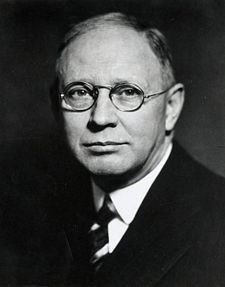- Clark L. Hull
-
Clark Leonard Hull 
Clark Leonard HullBorn 24 May 1884
Akron, New YorkDied 10 May 1952
New Haven, ConnecticutNationality American Fields psychologist Clark Leonard Hull (1884 - 1952) was an influential American psychologist who sought to explain learning and motivation by scientific laws of behavior. Born in Akron, New York, Hull obtained bachelor's and master's degrees from the University of Michigan, and in 1918 a PhD from the University of Wisconsin–Madison, where he also taught from 1916 to 1929. His doctoral research on "Quantitative Aspects of the Evolution of Concepts" was published in Psychological Monographs.
Hull conducted research demonstrating that his theories could predict and control behavior. His most significant works were the Mathematico-Deductive Theory of Rote Learning (1940), and Principles of Behavior (1943), which established his analysis of animal learning and conditioning as the dominant learning theory of its time. Hull is known for his debates with Edward C. Tolman. He is also known for his work in drive theory. Hull’s model is couched in biological terms: Organisms suffer deprivation. Deprivation creates needs. Needs activate drives. Drives activate behavior. Behavior is goal directed. Achieving the goal has survival value.
Contents
Formula to determine motivation
Hull's formula for determining motivation, was sEr = sHr * D
sEr = excitatory potential (likelihood that the organism would produce response r to stimulus s),
sHr = habit strength (derived from previous conditioning trials),
D = drive strength (determined by, e.g., the hours of deprivation of food, water, etc.)Later, a variety of other factors were gradually added to the formula to account for results not captured by this simple function. Eventually the formula became:
sEr = V x D x K x J x sHr - sIr - Ir - sOr - sLr
where V is the stimulus intensity
K is incentive motivation (size or quality of the reinforcer),
J is the incentive based on the delay of reinforcement,
Ir is reactive inhibition (i.e., fatigue) sIr is conditioned inhibition (due to previous non-reinforcement of r),
sLr is the reaction threshold (smallest reinforcement that will produce learning), and
sOr is momentary behavioral oscillation (error).The hypothetic-deductive method
In experimental psychology, he created the "hypothetic-deductive" systematic method, after the observation and elaboration of hypotheses. This method brought him precise definitions and conceptualised axioms which helped him develop his theories. He believed that behavior was a set of interactions between an individual and their environment. He analyzed behavior from a perspective of biological adaptation, which is an optimization of living conditions through need reduction.
Studies on hypnosis
Hull is often credited with having begun the modern study of hypnosis.
His work Hypnosis and Suggestibility (1933) was a rigorous study of the phenomenon, using statistical and experimental analysis. Hull's studies emphatically demonstrated once and for all that hypnosis had no connection with sleep ("hypnosis is not sleep, … it has no special relationship to sleep, and the whole concept of sleep when applied to hypnosis obscures the situation").
The main result of Hull's study was to examine the veracity of the apparently extravagant claims of hypnotists, especially regarding extraordinary improvements in cognition or the senses under hypnosis. Hull's experiments showed the reality of some classical phenomena such as mentally induced pain reduction and apparent inhibition of memory recall.
However, Clark's work made clear that these effects could be achieved without hypnosis being seen as a distinct state, but rather as a result of suggestion and motivation, which was a forerunner of the behavioural approach to hypnosis. Similarly, moderate increases in certain physical capacities and changes to the threshold of sensory stimulation could be induced psychologically; attenuation effects could be especially dramatic. Hull is famous for his signature hypnotic induction in which he would look at someone straight in the eyes until they were induced.[citation needed]
Recognition and death
Hull received the Warren Medal in 1945 from the Society of Experimental Psychologists. In 1929, he moved to Yale and stayed there until his death. He died on May 10, 1952, in New Haven, Connecticut.
External links
- "The Conflicting Psychologies of Learning: A Way Out", Clark L. Hull (1935), Psychological Review, 42, 491-516.
- Lemov, Rebecca (2005). World as Laboratory: Experiments with Mice, Mazes, and Men. New York: Farrar, Straus, and Giroux. Chapter 4.
Categories:- 1884 births
- 1954 deaths
- Hypnosis
- American psychologists
- Behaviourist psychologists
- University of Michigan alumni
- University of Wisconsin–Madison alumni
- University of Wisconsin–Madison faculty
- Yale University faculty
Wikimedia Foundation. 2010.

